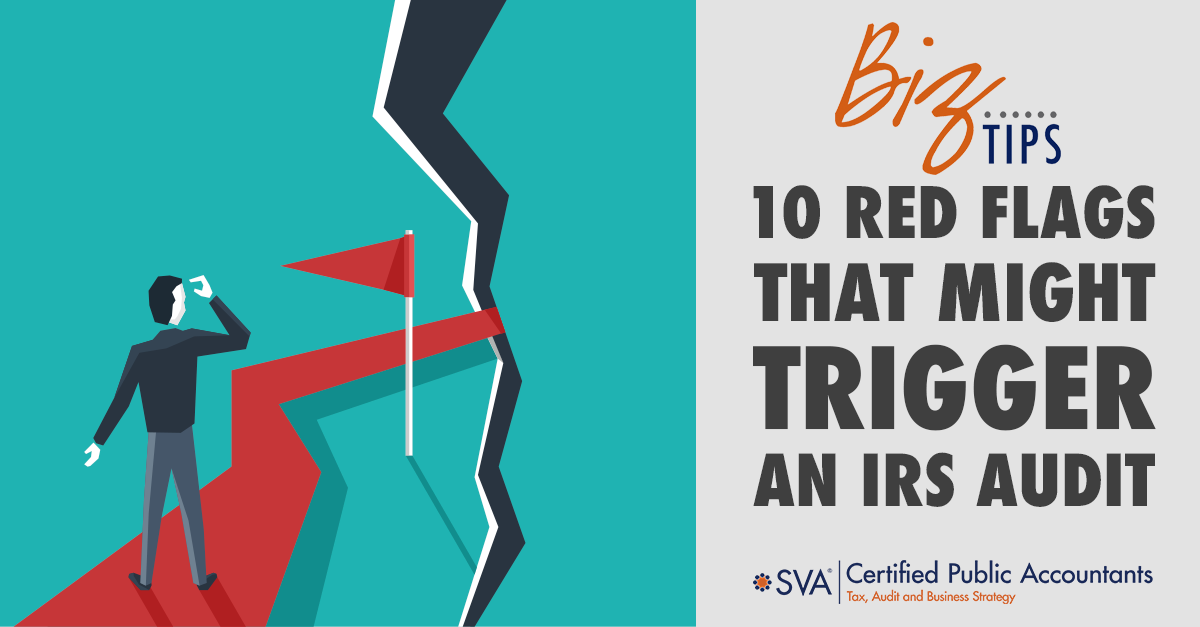Even though the overall IRS audit rate is currently low, it’s expected to increase as a result of provisions in the Inflation Reduction Act signed into law in August. So it’s more important than ever for taxpayers to follow the rules to minimize their chances of being subject to an audit.
This article discusses some of the tax return items that might trigger scrutiny from the IRS.
10 Red Flags for IRS Audits
How can you reduce your audit chances?
Watch for these 10 red flags that can trigger IRS scrutiny:
1. Large Charitable Donations
The IRS can reference data providing average charitable deductions based on various income levels. If you’re above average for your category, you might call attention to yourself. This is especially true if you’ve deducted charitable gifts of appreciated property.
So make sure your donations are all properly substantiated, including by independent appraisals if required.
2. Gambling Losses
Generally, you can deduct losses up to the amount of your winnings on your personal return, but you must have proof to back up your claims. If your gambling activities rise to the level of a professional gambler, you might be able to deduct a loss from other income, but the IRS often contests this tax treatment. Recognize the risks.
3. Unreported Income
It’s easy to miss income that might fall through the cracks, such as interest and dividends as well as nonemployee compensation from Form 1099-NEC. If you fail to report the income, the IRS may uncover a discrepancy with the forms it receives. Be sure to provide your tax professional with all forms you receive.
4. Rental Income and Deductions
You don’t want the IRS to find that you played fast and loose with the rules for rental properties. Showing a loss for the year despite a high rental rate could trigger an inquiry.
Generally, you may use up to $25,000 of loss to offset income from non-passive activities, but you must meet specific participation requirements. Check with your tax advisor to see if you’re on firm ground.
5. Home Office Deductions
If you use a portion of your home regularly and exclusively for your business, you may be able to deduct the expenses and depreciation associated with the space. Usually, the greater the business percentage claimed for use of the home, the greater the audit risk.
Employees who work from home (as opposed to self-employed people) currently can’t claim a home office deduction. Now that more people are working from home, the IRS may look for taxpayers trying to bend the rules.
(Download Video Transcript)
6. Casualty Losses
Despite recent legislative changes restricting casualty loss deductions, you can still write off losses to personal property sustained in a federally designated disaster area. But be aware that the IRS may scrutinize appraisals to determine if you’re inflating a disaster-area loss.
7. Business Vehicle Expenses
The IRS often flags returns with large deductions for business vehicles, especially if they reflect double-digit depreciation allowances.
Briefly stated, you’re required to keep a contemporaneous log of your driving activities, along with proper substantiation. Collect all the proof needed to withstand an IRS challenge.
8. Cryptocurrency Transactions
This is a relatively new potential audit target. The IRS now specifically asks on your return if you’ve bought or sold cryptocurrency. If you’ve answered yes, be prepared to substantiate the transaction information.
9. Day Trading Activities
Most taxpayers offset capital gains and losses from securities sales on Schedule D of their personal tax returns. But claiming to be a “day trader” may help you benefit from favorable tax provisions, including deductions for specific expenses.
If you do this, consult with your tax advisor to ensure you’re ready to respond to any IRS inquiries.
10. Foreign Bank Accounts
Checking the box on Schedule B that indicates you have a foreign bank account could increase your chances of an audit. But failing to check the box when you should do so may also trigger an audit. The IRS matches up information it receives on foreign bank accounts.
Generally, a taxpayer must file a Report of Foreign Bank and Financial Accounts (FBAR) if the aggregate value of assets in foreign bank accounts exceeded $10,000 during the prior year.
Of course, this isn’t the end of the list. There are many other potential audit triggers, depending on a taxpayer’s particular situation. Also, keep in mind that some audits are done on a random basis. So even if you have no common triggers on your return, you still could be subject to an audit (though the chances are lower).
With proper tax reporting and professional help, you can reduce the likelihood of triggering an audit. And if you still end up being subject to one, proper documentation can help you withstand it with little or no negative consequences.
© 2022

